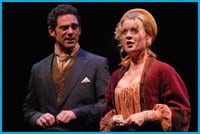Loosely based on George Gissing’s 1893 novel The Odd Women, Linda Griffiths’ Age of Arousal is a serio-comic portrait of various late 19th- and early 20th-century feminists. Known as suffragists these women fought for the right to gain legal independence from men. Sporting a cast of five brilliant sexy women and one hot charismatic man, the text opens with a lesbian encounter and proceeds to challenge every sex/gender equation over the course of two hilarious and ingenious acts.
Unlike other Canadian plays dealing with similar subject matter (Wendy Lill’s The Fighting Days from 1985, for example) Griffiths’ script treads lightly over specific historical moments and focuses on the ways in which love, sex and gender weave themselves into tight social knots that trouble political action, forcing women to make hard and fast decisions about their bodies and their lives.
Through the use of what Griffths calls “thoughtspeak,” characters are able to, in her words, “speak their thoughts in wild and uncensored outpourings.” This accounts for much of the comedy, providing actors with the opportunity to move in and out of earnest dialogue, vary their tone of voice and treat audiences to irreverent, side-splitting critiques of dominant social mores. Alice, played by Maggie Huculak, delivers a brief thoughtspeak indictment of motherhood that is perfectly balanced with sentimentality, respect and irreverence. Warning: When she speaks of “babies with club feet or… huge bulbous ears” some audience members may feel the urge to laugh uproariously at an example of dark, cathartic comedy that challenges and mocks traditional notions of maternal instincts and compulsory parenthood.
It is impossible to pick one cast member out of an ensemble that moves effortlessly across the stage, interacting and flying solo at pivotal moments in a beautifully staged and sumptuously costumed pageant of thought and action from director Maja Ardal and costume designer Julia Tribe. Clare Coulter, as Mary Barfoot, provides an incredibly strong sense of wisdom, authority and physical prowess that each actor is able to match in individual and distinct performances.
The formidable task of playing alongside five highly skilled women is left to Dylan Smith. He skillfully provides the audience with a character we can both admire and vilify as he slithers and charms his way into the lives of five independent souls. Griffiths has wisely chosen to insert only one male voice, representing the historical power with which we continue to struggle. Mrs Banks, from the largely unsung feminist tract Mary Poppins, says it best when she sings in “Sister Suffragette,” “Though we adore men individually/ We agree that as a group they’re rather stupid!”
Ellen-Ray Hennessy, as Virginia Madden, bridges the gap between male and female as she beautifully collapses caricature and powerful acting into a single flawless performance. The fine layering of serious political content and biting, often satiric thoughtspeak is served well by a cast and production crew who appear to fully understand that every age is marked by complex and titillating notions of lust, sex and arousal.

 Why you can trust Xtra
Why you can trust Xtra


